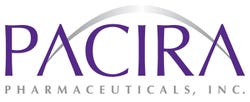August 4, 2017
New study shows decrease in opioid consumption.
DePuy Synthes and Pacira Pharmaceuticals Inc. are partnering to provide orthopedic patients long-lasting, non-opioid postsurgical pain control at the surgical site, and a recent study shows positive results.
 In the partnership, which was announced earlier this year, DePuy Synthes Sales and Pacira Pharmaceuticals are copromoting EXPAREL (bupivacaine liposome injectable suspension) exclusively in the United States. Indicated for single-dose infiltration into the surgical site to produce postsurgical analgesia, EXPAREL launched in the United States in April 2012.
In the partnership, which was announced earlier this year, DePuy Synthes Sales and Pacira Pharmaceuticals are copromoting EXPAREL (bupivacaine liposome injectable suspension) exclusively in the United States. Indicated for single-dose infiltration into the surgical site to produce postsurgical analgesia, EXPAREL launched in the United States in April 2012.
"DePuy Synthes is responsible for detailing EXPAREL in the U.S. market, training surgical staff, providing intra-operative technical support for the product, and including multimodal pain management (including EXPAREL) in our professional education courses," said Joshua Mundy, senior director, commercial strategy and alliances, at DePuy Synthes Companies of Johnson & Johnson, in an email to Qmed.
"We have extensive reach in the orthopedics and spine space, giving DePuy Synthes the opportunity to bring EXPAREL to joint reconstruction, spine, sports medicine, and trauma patients in the U.S. for in-hospital and outpatient procedures," he continued. "To date, we have been actively working with our orthopedic surgeon customers across the country to enhance the availability and access of the product and we will continue to do so."
 Pacira recently reported that its Phase 4 PILLAR study of EXPAREL use in total knee arthroplasty (TKA) shows a significant decrease in opioid consumption and better pain control. "In the Phase 4 PILLAR study, total knee replacement patients who received infiltration with EXPAREL admixed with bupivacaine HCl demonstrated a 78% decrease in opioid consumption compared to patients receiving an infiltration of bupivacaine alone," Dave Stack, CEO and Chairman of Pacira Pharmaceuticals, told Qmed in an email. "Additionally, 10% of patients in the EXPAREL group required no opioids at all through 48 and 72 hours. The ability to effectively manage postsurgical pain with reduced--or in some cases completely eliminated--reliance on opioids has the potential to significantly improve patient care, time to recovery, and hospital throughput."
Pacira recently reported that its Phase 4 PILLAR study of EXPAREL use in total knee arthroplasty (TKA) shows a significant decrease in opioid consumption and better pain control. "In the Phase 4 PILLAR study, total knee replacement patients who received infiltration with EXPAREL admixed with bupivacaine HCl demonstrated a 78% decrease in opioid consumption compared to patients receiving an infiltration of bupivacaine alone," Dave Stack, CEO and Chairman of Pacira Pharmaceuticals, told Qmed in an email. "Additionally, 10% of patients in the EXPAREL group required no opioids at all through 48 and 72 hours. The ability to effectively manage postsurgical pain with reduced--or in some cases completely eliminated--reliance on opioids has the potential to significantly improve patient care, time to recovery, and hospital throughput."
When asked how reducing opioid use could impact patients and healthcare in general, Stack said that "although opioids are potent analgesics, they are associated with several unwanted and potentially life-threatening adverse events that can delay patient ambulation, recovery, and hospital discharge. These adverse events can range from nausea, vomiting, constipation, urinary retention, dizziness, and confusion to oversedation and respiratory depression. Patients whose postsurgical pain is managed without the need for high doses of opioids are able to recover with a reduced exposure to their debilitating adverse events. As such, they often feel well enough to mobilize more quickly after surgery, which can lead to faster initiation of physical therapy and earlier hospital discharge.
"These are important considerations for both patient satisfaction as well as healthcare economics," he added. "This is especially true in light of the CMS bundled payment initiative, which aims to encourage hospitals, physicians, and post-acute care providers to work together to improve the quality and coordination of care from the initial hospitalization through recovery."
Use of EXPAREL is also expected to help DePuy Synthes Companies work toward their Triple Aim goals of improving clinical outcomes, reducing costs, and enhancing patient satisfaction. "There are millions of orthopedic procedures performed in the U.S. market today where we can improve patient care and the surgical experience by offering a long acting, intra-operatively delivered local anesthetic infiltration solution," stated Juan-José Gonzalez, President, DePuy Synthes U.S., in a statement released earlier this year. "As part of our focused approach to help bring value at every point along the care pathway, we are thrilled to be able to further our offerings through partnering with Pacira and together provide a differentiated solution for our customers to help improve patient outcomes."
Daphne Allen is executive editor of Pharmaceutical & Medical Packaging News and a contributor to MD&DI and Qmed. Reach her at [email protected] and on Twitter at @daphneallen
[Image credit: DePuy Synthes Companies and Pacira Pharmaceuticals]
About the Author(s)
You May Also Like




